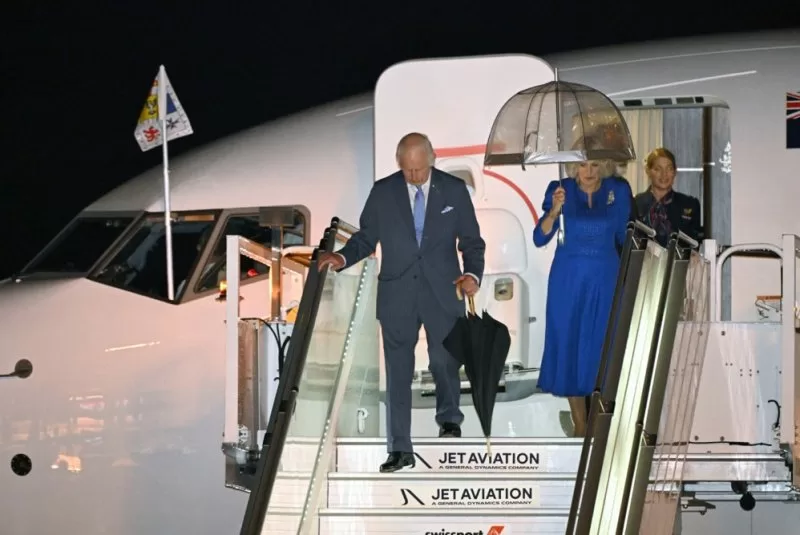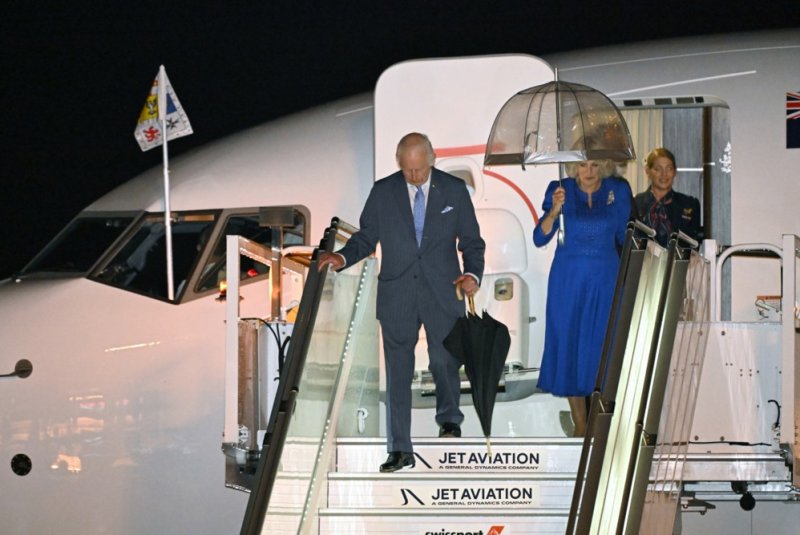Britain’s King Charles III (L) and Queen Camilla arrive in Sydney on Oct. 18 for a weeklong tour of Australasia and the Pacific. Opening a meeting of British Commonwealth heads in Samoa on Thursday the king appeared in a speech to endorse calls by some leaders of the bloc for reparatory justice. File photo by Dean Lewins/EPA-EFE
Oct. 24 (UPI) — British Commonwealth leaders meeting on the Pacific island of Samoa are set to hold talks on an agreement to seek justice for suffering and damage from the transatlantic slave trade that could see Britain — one of the main actors and beneficiaries — on the hook for billions of dollars in reparations.
The proposal for an in-depth look at the issue at the three-day Commonwealth Heads of Government Meeting goes against the wishes of Britain, represented at the five-day gathering by King Charles III and Prime Minister Keir Starmer, which insisted the matter was not on the agenda.
“Heads, noting calls for discussions on reparatory justice with regard to the transatlantic trade in enslaved Africans and chattel enslavement agreed that the time has come for a meaningful, truthful and respectful conversation towards forging a common future based on equity,” reads the draft of text to be included in a communique issued at the close of the summit Sunday that was leaked to the BBC.
“Head of government will take an active role in bringing about such inclusive conversations addressing these harms and prioritize and facilitate further and additional research on the transatlantic trade in enslaved Africans and chattel slavery that encourages and supports the conversations and informs a way forward.”
A spokesperson for the British government said reparations were not on the agenda for the summit.
“The government’s position has not changed — we do not pay reparations,” the BBC quoted the spokesperson as saying.
In negotiations on the communique ahead of the summit Britain opposed any mention of reparatory justice but only managed to head off a separate declaration calling for it that could have caused a damaging split and was unable to block the paragraphs detailing the position of the commonwealth.
Starmer arrived Thursday telling reporters that slavery was “completely abhorrent” but he would rather “roll up” his sleeves and work with the other leaders on pressing future-facing challenges like climate change, as opposed to getting bogged down in “very, very long, endless discussions about reparations.”
“I’ve talked to a lot of our Commonwealth colleagues in the Commonwealth family and they’re facing real challenges on things like climate in the here and now. And in all the conversations I’ve had with them, what they’re most interested in is — can we help them working with for example international institutions, financial institutions on the sorts of packages they need right now,” said Starmer.
Bahamas Prime Minister Philip Davis countered by arguing that making the correct decisions for the future was only possible through a thorough understanding of the past.
“Let’s have a conversation about this. We all appreciate this, the horrendous impact that the Transatlantic slave business had on the African diaspora and it requires justice,” he told Politico.
“It’s not just about an apology. It’s not about money. It’s about an appreciation and embracing and understanding of what our ancestors went through, that has left a scourge on our race, culturally, mentally and physically.”
However, Davis said that possible settlement figures previously floated ranging from $260 billion to $23 trillion may not be adequate.
“For me, I don’t know that money, in and of itself, could adequately compensate for the wrongs of the past. The ghost that haunts us today cannot be, in my view, dispelled by a monetary gift.”
In his speech opening the summit Thursday, the king appeared to endorse addressing the harms caused by the trade that saw between 10 million and 12 million enslaved black Africans transhipped across the Atlantic Ocean to the Americas between the 1500s and 1800s, saying acknowledgment was essential for the 55-country bloc to be able to look to the future.
“While we strive together for peace, prosperity and democracy I want to acknowledge that the roots of our contemporary association run deep into the most painful period of our history. I cannot describe the depths of my personal sorrow at the suffering of so many, as I continue to deepen my own understanding of slavery’s enduring impact,” Charles said.
“If we are to forge a common future that benefits all our citizens, we too must find new ways to acknowledge our past. Quite simply, this is a conversation whose time has come.”
The Bahamas’ Foreign Minister Frederick Mitchell said he was confident the issue would not prove as divisive as people feared and that bringing the issue out into the open was the correct route.
“Once you broach the subject it may take a while for people to come around but come around they will,” he told BBC Radio.

